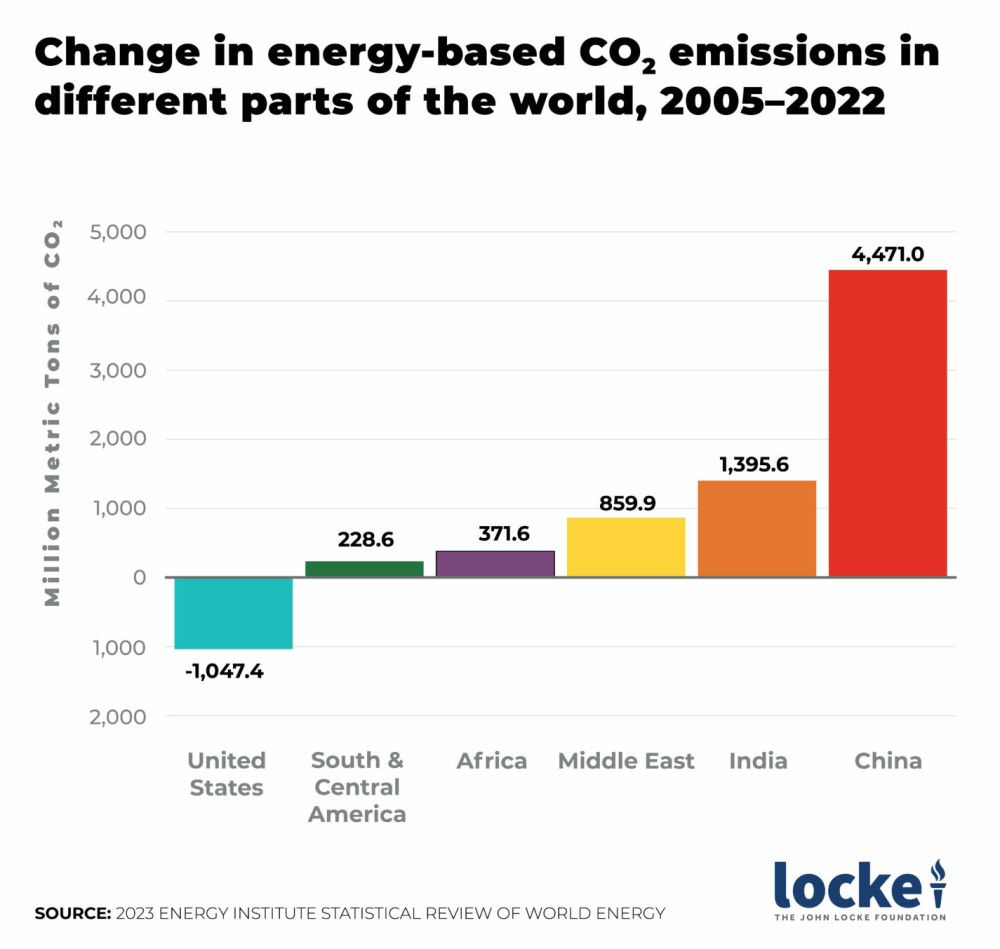A Constitutional Republic, where the First Amendment is Essential to OUR Survival
What Is “China Carbon Time,” and What Does It Mean for States’ Efforts to Decarbonize Their Grids?
Remember North Carolina's Carbon Plan? The biggest feature of the plan is the retirement of over 9,000 MWs of coal-fired generation by 2035. That's a mere one-thirtieth of the amount of coal power that China plans to add just in the next three years, as the first graph above shows.
Further implications: Costs and benefits revisited
There are several implications from this exercise. First, China's CO2 emissions from energy are still on the increase. As they grow, it will mean each state's China Carbon Time will arrive even earlier.
Also, it's not just China. Energy-based CO2 emissions across Africa (371.6 million metric tons), the Middle East (859.9), and South and Central America (228.6) have all increased since 2005. India's emissions increased by 1,395.6 million tons. The U.S. has cut a greater amount of emissions than any other nation on earth (-1,047.4 million metric tons).

So global CO2 emissions are still increasing, despite people in the U.S. now being asked to shoulder enormous costs to cut their electricity-based emissions more. A state can destroy working power plants and impoverish and endanger its own citizens, but it won't affect the world's climate one bit. It can't.
It's certainly not Americans' business to try to offset other nations' increased emissions by forcing further reductions in ours - and greatly reducing our own welfare in the process. And this exercise doesn't even address the issue of whether reduced global CO2 emissions would actually result in significant decreases in destructive weather events as hypothesized. Emissions are clearly not being reduced if all we can do is chip away a bit at the overall increase.
For all those reasons, state policies forcing CO2 reductions are all cost, no conceivable benefits to their citizens. Consider: what good is closing all of North Carolina's coal-fired power plants and doubling electricity rates on people if China is adding 30 times that amount in a fraction of the time?
The U.S. has, thanks to fracking and market choices, already reduced its volume of energy-based CO2 emissions by more than any other nation in the world. Any costs that the U.S. or individual states impose on taxpayers and ratepayers here to reduce CO2 emissions from electricity generation further would necessarily be enormous wastes of other people's money and resources. It would gain nothing and only leave people worse off.
Go Back
Further implications: Costs and benefits revisited
There are several implications from this exercise. First, China's CO2 emissions from energy are still on the increase. As they grow, it will mean each state's China Carbon Time will arrive even earlier.
Also, it's not just China. Energy-based CO2 emissions across Africa (371.6 million metric tons), the Middle East (859.9), and South and Central America (228.6) have all increased since 2005. India's emissions increased by 1,395.6 million tons. The U.S. has cut a greater amount of emissions than any other nation on earth (-1,047.4 million metric tons).

So global CO2 emissions are still increasing, despite people in the U.S. now being asked to shoulder enormous costs to cut their electricity-based emissions more. A state can destroy working power plants and impoverish and endanger its own citizens, but it won't affect the world's climate one bit. It can't.
It's certainly not Americans' business to try to offset other nations' increased emissions by forcing further reductions in ours - and greatly reducing our own welfare in the process. And this exercise doesn't even address the issue of whether reduced global CO2 emissions would actually result in significant decreases in destructive weather events as hypothesized. Emissions are clearly not being reduced if all we can do is chip away a bit at the overall increase.
For all those reasons, state policies forcing CO2 reductions are all cost, no conceivable benefits to their citizens. Consider: what good is closing all of North Carolina's coal-fired power plants and doubling electricity rates on people if China is adding 30 times that amount in a fraction of the time?
The U.S. has, thanks to fracking and market choices, already reduced its volume of energy-based CO2 emissions by more than any other nation in the world. Any costs that the U.S. or individual states impose on taxpayers and ratepayers here to reduce CO2 emissions from electricity generation further would necessarily be enormous wastes of other people's money and resources. It would gain nothing and only leave people worse off.






















